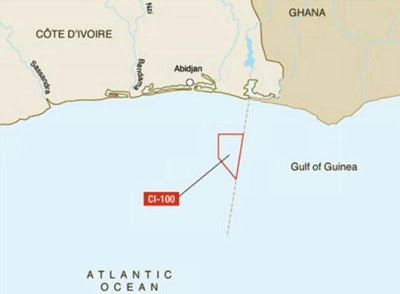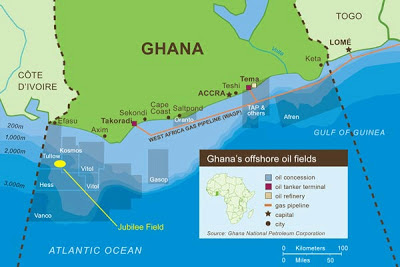This week, international news media reported that France’s Total had struck oil on the CI-100 block off Ivory Coast adjacent to Ghana’s giant Jubilee Field. The block is very close to the Jubilee and TEN (Tweneboa-Enyenra-Ntomme) Fields. It lies right at the imaginary international maritime border line with Ghana and could possibly be a separate extension of the Jubilee oil play. The Tano basin is an already proven petroleum basin with a prolific play potential so this comes as no surprise to some of us who have been following events in the West African oil and gas industry.
Ghana and Cote D’Ivoire entered into a diplomatic row over a similar find in Ghana’s territorial waters about two years ago and this new find is likely to aggravate the dispute. The biggest challenge, however, are the security implications of the Ivorian oil find for Ghana.
 The find will further deepen the Ivorian cause in the maritime border dispute with Ghana currently before the UN’s International Seabed Authority. Don’t be surprised if more discoveries that straddle both Ghana and Ivory Coast maritime border are made. Some studies put potential estimates of about 8 billion barrels of oil and gas reserves in this region alone. The disputed area covers portions of the Jubilee Field, Tweneboa, Enyenra, the Owo discoveries, West Tano-1X find and the deep-water Tano block in Ghana’s territorial waters. Tullow, Kosmos, Vanco and others are exploring for commercial oil plays in this ultra deepwater terrain. Ghana’s application to extend its continental and territorial shelf beyond the statutory 200 nautical miles is still pending at the United Nations.
The find will further deepen the Ivorian cause in the maritime border dispute with Ghana currently before the UN’s International Seabed Authority. Don’t be surprised if more discoveries that straddle both Ghana and Ivory Coast maritime border are made. Some studies put potential estimates of about 8 billion barrels of oil and gas reserves in this region alone. The disputed area covers portions of the Jubilee Field, Tweneboa, Enyenra, the Owo discoveries, West Tano-1X find and the deep-water Tano block in Ghana’s territorial waters. Tullow, Kosmos, Vanco and others are exploring for commercial oil plays in this ultra deepwater terrain. Ghana’s application to extend its continental and territorial shelf beyond the statutory 200 nautical miles is still pending at the United Nations.
Similar disputes between Nigeria and Sao Tomé and Principé which highlights the fact that geology is no respecter of artificial political boundaries led to the development of the Joint Development Zone (JDZ) and revenue sharing agreements.The new find in Cote D’Ivoire may dent a blow to some investors, but I don’t foresee a big challenge provided Ghana and Cote D’Ivoire can agree on a framework for collaboration within a JDZ framework for fields which straddle both maritime borders after the UN ruling is made.

Section 11 of Ghana’s Draft Petroleum (Exploration and Production) Bill currently pending before parliament on Joint Development Zones states, “The Republic shall seek to reach agreement with another country on the most efficient co-ordination of petroleum activity in connection with a petroleum accumulation as well as on the apportionment of the petroleum accumulation where a petroleum field extends onto the land or the continental shelf of another country.”
We need to act strategically within a broader national and regional interest. Confrontation will only compound the problem. Ghana and Cote D’Ivoire should work collectively to exploit the oil and gas resources that straddle both countries for the greater wellbeing of their people.
Relevant Links
- Draft Exploration and Production Bill: http://www.eisourcebook.org/cms/files/attachments/policy-legal-contractual-regulatory/Ghana%20-%20Petroleum%20(Exploration%20and%20Production)%20Bill%202010.pdf
- http://www.upi.com/Business_News/Energy-Resources/2013/04/26/Total-makes-oil-find-offshore-Ivory-Coast/UPI-46841366973446/
- http://uk.reuters.com/article/2013/04/25/total-ivorycoast-idUKL6N0DC3G220130425
